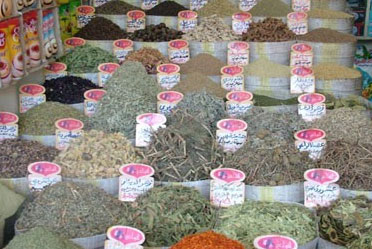DAMASCUS, (ST) – Director of the Production Plant at the Ministry of Agriculture and Agrarian Reform, Abdul Mou’in Qadmani, underlined that investment in medicinal and aromatic plants is considered economically profitable projects being spread naturally in various areas of Syria, noting that these plants don’t need much toil, whereas other crops need irrigation and fertilization.
“The ministry is following up the agricultural production plan of some medicinal and aromatic crops such as cumin, anise, cumin, coriander, saffron, thyme, and damascene rose,” Mr. Qdmani said.
The total area planned for this season 2012-2013 is about 77055 hectares distributed to the governorates of Damascus Countryside 1113 hectares, Homs 3762 hectares, Hama 8764 hectares, Al Ghab Plain 1280 hectares, Idlib 13726 hectares, Tartous 28 hectares, Aleppo 36605 hectares, Al Raqqa 4157 hectares and Hasaka 7620 hectares, Mr. Qdmani pointed out.
“The average production per hectare of this crop is approximately 1200 kg and the average annual production is 9200 tons of crops included the agricultural production plan,” Mr. Qdmani clarified.
He pointed out that the area planted during the past 2011-2012 season amounted to 72236 hectares and cumin is considered on of the major crops where the total area planted of this crop is 58634 hectares, comprising 81 percent of the total cultivated area.
“Due to the increasing demand for these agricultural products and high prices on the local and regional level, the interest in growing such crops increased. In the current years, local investments started taking care about producing medicinal and aromatic plants for their multiple uses in the pharmaceutical industry, cosmetics, perfumery and food,” Mr. Qdmani stressed.
He pointed out that growing medicinal and aromatic plants are considered environmentally friendly because these crops do not need large amounts of fertilizers and pesticides and thus the cost of production is low as they don’t need large amounts of water and can also grow in the medium fertility land.
The Ministry is working with bodies concerned to invest in this sector, whereas technical committees were formed with the participation of several bodies from the Ministry of Agriculture, Public Authority for Agricultural Researches, Directorate of Plant Production, Directorate of Forestry, Colleges at the University of Damascus Medicine, Pharmacy, Agriculture, Science and Ministry of Culture. The Committee has listed 263 medicinal and aromatic plants spread within the Syrian territory.
Sh. Kh.

